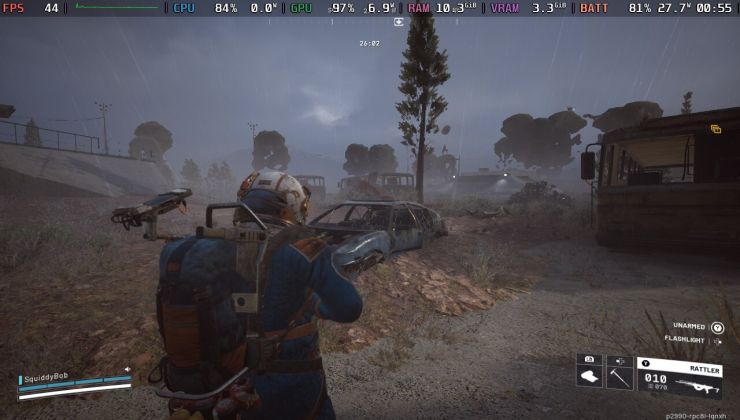Mesa 22.1.0 is out now bringing tons of improvements for open source graphics drivers for OpenGL and Vulkan. The official Mesa website doesn't (yet) have a changelog up, but you can peruse it like I did over on the official GitLab.
New Features Supported:
- d3d12 GL4.2
- GL_NV_pack_subimage
- VK_EXT_depth_clip_control on lavapipe and RADV
- Vulkan 1.3 support on lavapipe
- VK_EXT_graphics_pipeline_library on lavapipe
- VK_EXT_primitives_generated_query on lavapipe
- VK_EXT_image_2d_view_of_3d on ANV and lavapipe
- VK_KHR_swapchain_mutable_format on lavapipe
- Intel DG2 support
Lots of bug fixes and overall improvements elsewhere including a number for gaming like fixing: fog effects in Elden Ring on AMD RADV, texture seams in The Evil Within 2 on RADV, poor performance in Ghostwire: Tokyo on RADV, Quake 2 RTX v1.6.0 having corrupted graphics in RADV and artifacts seen in Senran Kagura Shinovi Versus.
Improvements elsewhere like fixing up a memory leak for Apex Legends, glitches in Grid Autosport with AMDGPU, Aperture Desk Job rendering issues with Intel, occasional flicker seen in Rage 2 with AMD ACO, rendering issues in Outer Wilds on Intel ANV, colour distortion in Black Geyser: Couriers of Darkness fixed up, rendering corruption in DOOM Eternal on Intel ANV and the list goes on.
That's just bug fixes, there's also tons of big improvements to the Zink driver that gives OpenGL over Vulkan, work pulled in for the PowerVR Rogue Vulkan driver from Imagination, improvements to Ray Tracing for AMD, adding support for Intel Arctic Sound M, an on-disk shader cache for the Raspberry Pi V3D driver and much more.
I never used to care hugely about Mesa updates when I was on Mint/Pop because it would be either weeks or a full distro re-install before I got to enjoy them (even on Oibaf or Kisak PPAs), but I get them within a day or so now on Endeavour.
How quickly do Fedora update this stuff?
Quoting: scaineHow quickly do Fedora update this stuff?Usually rather quickly. You can see that Mesa 22.1 already has packages made and currently considered as update-candidate.
https://koji.fedoraproject.org/koji/packageinfo?packageID=184
Quoting: SolitarySo how does it work on Fedora? Are those just official packages, updated that quickly? Or is there an equivalent to a PPA that you have to opt into to get updates that fast? I remember back in the early Ubuntu days, you had to opt into backports to get the good stuff, which was just a tick box in your package manager. Is it like that? Or is this just the standard update cycle for Fedora?Quoting: scaineHow quickly do Fedora update this stuff?Usually rather quickly. You can see that Mesa 22.1 already has packages made and currently considered as update-candidate.
https://koji.fedoraproject.org/koji/packageinfo?packageID=184
Quoting: scaineWhat you are looking at are official packages. There is also Koji for rpmfusion packages. For certain core packages Fedora is indeed quick, but for example Fedora 35 doesnt have Mesa 22 (yet? or ever? not sure). Fedora also has rolling kernel, so that's also usually pretty fast and new. Fedora does have user repos (checkout Fedora Copr), but as far as I am concerned those tend to be used for either obscure or officially poorly supported (old packages in main repos) or really bleeding edge stuff (you want Mesa 22.1 two weeks earlier). And I feel people don't tend to use them as much. In comparison to constatntly hearing about PPA, this tends to be more lowkey niche.Quoting: SolitarySo how does it work on Fedora? Are those just official packages, updated that quickly? Or is there an equivalent to a PPA that you have to opt into to get updates that fast? I remember back in the early Ubuntu days, you had to opt into backports to get the good stuff, which was just a tick box in your package manager. Is it like that? Or is this just the standard update cycle for Fedora?Quoting: scaineHow quickly do Fedora update this stuff?Usually rather quickly. You can see that Mesa 22.1 already has packages made and currently considered as update-candidate.
https://koji.fedoraproject.org/koji/packageinfo?packageID=184
Obviously any QA issues will slow down the package. If this Mesa build will be deemed bad then next one will be created and go through another QA. Then the tag will change into either update-testing (user needs to have testing repos enabled) or update (proper).
Quoting: Serious_TableSo, pardon the absolute novice of a question here, but: when I go and investigate Mesa on the Steam Deck, it appears they have a version 21.x.x installed. I'm going to assume this release of 22.1 isn't going to get pushed to the Deck until much later? Does Valve do their own custom stuff to the Mesa driver, or (should you be an adventuring user) would this theoretically work out of the box if you were to manually download it to your Deck from Desktop mode?While Valve on their Steamdeck uses a rolling release distro (Archlinux) with almost always up-to-date packages, they don't push packages updates to the user as soon as available. They are probably waiting a few weeks, testing the whole thing and then push it if it doesn't break anything.
You could probably disable the read-only disk and update your system yourself. But your changes it will be overwritten on the next system update.
Last edited by dindon on 20 May 2022 at 6:24 am UTC
So no need to wait for anyone to package it or to even package it in the first place. I.e. just setting a few environment variables, you can launch games using Mesa placed in some custom location.
Last edited by Shmerl on 22 May 2022 at 5:18 am UTC
https://www.dropbox.com/s/pikeuge0znvw15l/Screenshot_20220520_144850.jpg?dl=0








 How to setup OpenMW for modern Morrowind on Linux / SteamOS and Steam Deck
How to setup OpenMW for modern Morrowind on Linux / SteamOS and Steam Deck How to install Hollow Knight: Silksong mods on Linux, SteamOS and Steam Deck
How to install Hollow Knight: Silksong mods on Linux, SteamOS and Steam Deck